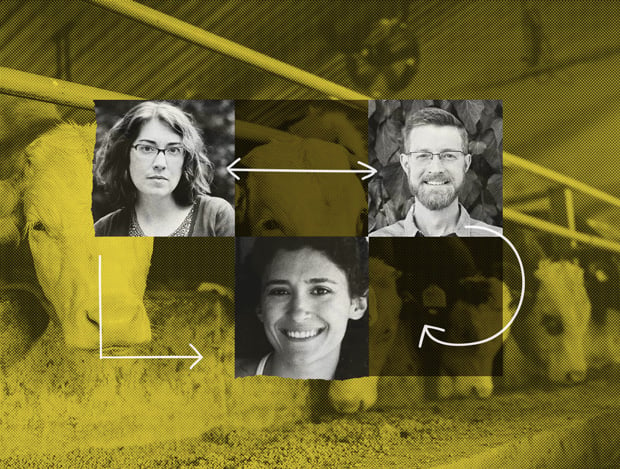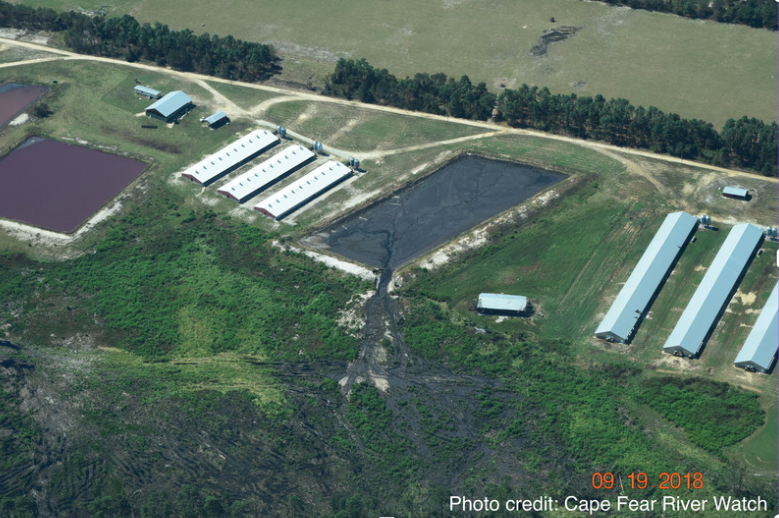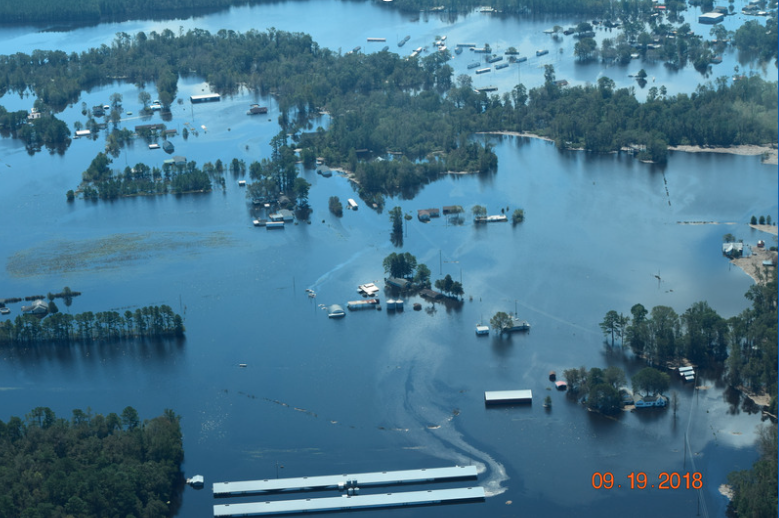How Our Legal Team Protects Communities from Factory Farms
Published Mar 11, 2024

Factory farming is one of the most polluting and least regulated industries in the country. Our legal team details how they’re using the courts to change this.
Living in the Cape Fear Basin and working as an advocate for Cape Fear River Watch, Kemp Burdette is very familiar with factory farms. The basin, which stretches through North Carolina, has the highest concentration of factory farms anywhere on earth. And the industry’s pollution has been disastrous for community health and the environment, enabled by lax regulations.
For sixteen years, Kemp has worked to protect Cape Fear communities from factory farms. More recently, he joined Food & Water Watch’s legal team as a declarant in one of our lawsuits, challenging weak federal water protection regulations on factory farms.
In our February Livable Future Live event, Kemp sat down with the team to discuss how we use the courts to take on Big Ag. Alongside him, we also heard from our legal director Tarah Heinzen and staff attorneys Emily Miller and Tyler Lobdell.
Communities Need Stronger Regulations, and Agencies Need to Follow the Law
Factory farms pose a grave threat to neighboring communities because of their massive waste problem. There are few rules for how these facilities must handle their waste and next to no monitoring, which means it often goes right into our water and air.
“I’ve talked to neighbors who can’t go outside when the hog farm next door to them is spraying because the air quality is so bad that it will trigger asthma or emphysema,” Kemp told us. And it’s a regular occurrence for neighbors of hog farms to have aerosolized hog waste drifting into their property and landing on them.
“We’ve taken water samples from creeks near factory farms,” Kemp said, “that show bacteria levels as high as 600 times more than the level that the State has said is safe for human contact.”

We have laws on the books that are supposed to prevent this. However, regulators’ weak efforts to implement these laws have given the industry free rein. And that’s where Food & Water Watch steps in.
For example, one of our major cases challenges the Environmental Protection Agency’s (EPA) lax oversight of factory farms under the federal Clean Water Act. The Clean Water Act is one of our landmark environmental laws, and it is responsible for cleaning up countless lakes, rivers, and streams.
It established a system that requires polluters to get permits, which set limits on how much they can discharge. Notably, the Clean Water Act says that factory farming is an industry that the EPA has to regulate under the permit program — but we’re not seeing that put into practice.
The agency itself estimates that three-fourths of factory farms discharge pollution to waterways, Emily noted, yet less than a third have the required permit. The result: almost 10,000 factory farms across the country are violating the Clean Water Act and illegally polluting — devastating community health and the environment in the process.
Without Federal Regulation, the Industry Will Keep Growing
In North Carolina, local leaders like Kemp have tried many avenues to protect their communities. They’ve fought individual projects and reported pollution to state agencies, but saw little change.
Meanwhile, the state legislature has slashed the budgets of regulatory agencies, and environmental protection bills have failed to pass. Kemp points toward the size and influence of the hog and poultry industry in the state as a reason why.
This is all leading to even more factory farms, he told us. And it’s not just happening to North Carolina — it’s happening across the country. For example, Oregon is currently experiencing an influx of chicken factories, and the state is trying to avoid regulating them.
“In light of the states’ position there, the onus is placed on the community to really try to fight these factory farms one by one,” Emily said. “And so, having strong federal regulation that has uniform standards in place … is really crucial, and a more durable solution to this problem.”
Without federal regulations, Kemp stressed, “the states with the weakest regulations are going to start to just be inundated with the industry, which is kind of licking their chops at a state that’s weak and unprepared for what’s coming.”

Food & Water Watch Takes on the EPA to Hold Factory Farms Accountable
One reason that factory farms get away with avoiding regulation altogether is that the EPA doesn’t require them to monitor their water pollution. For a long time, the industry has simply said “We don’t pollute water!” and the EPA has taken it at its word. But the science is clear — as Tyler put it, “We know that factory farms routinely, and frankly by design, pollute water. It is built into the structure of the factory farm model.”
So in 2021, we took the agency to federal court over this and won. Now, the EPA and states must require permitted factory farms to monitor their water pollution, just like any other polluting industry. This is essential for communities, which can and do use reported data to hold polluters accountable — in fact, citizen enforcement has been critical to the Clean Water Act’s success.
At the same time, the Clean Water Act requires the EPA to review and strengthen its standards as technologies get better at controlling industries’ waste. But for more than 15 years, the EPA has just waved in the existing standards for factory farms.
In 2023, in response to another Food & Water Watch lawsuit, the agency said it would launch a study of factory farm water pollution to decide whether it will finally update the outdated standards. This is the bare minimum, but it’s an important first step. We’re now following the EPA every step of the way to make sure its study takes current science and technology improvements into full account.
This kind of legal work is critical, Tyler emphasized, and it’s what makes Food & Water Watch unique in this space. “We approach litigation like we approach all of our work at Food & Water Watch,” he said. “We are willing to fight for the bold solutions that we truly need, rather than working for incremental improvements based on this rigged system that exists currently.”
Using Legal Strategies to Change the Narrative on Factory Farming
Food & Water Watch has also fought factory farms at the state level. Recently, our organizing team worked to pass a factory farm bill in Oregon while also challenging local projects, like the proposed Easterday mega-dairy.
Legal work was central to these efforts. The team petitioned the EPA to take emergency action on Eastern Oregon’s nitrate pollution crisis, to which factory farms contribute, and petitioned state agencies to adopt new regulations.
Such legal strategies, Tarah noted, help to drive publicity and public awareness. They show policymakers that this is an important issue to their constituents. They also help lift up the voices of grassroots allies and environmental justice communities on the ground.
In Oregon, they helped build the case and the political support for SB 85, a recently passed regulatory bill that has already stopped two planned poultry factories in the state.
“Litigation can really effectively shine a spotlight on the special treatment that agencies like EPA are giving to factory farms,” Tarah said. “We can help keep our issues in the news and advance our narrative about the need not only to regulate pollution, but ultimately to move away from this really destructive model of livestock production and fundamentally reform our food and farm system.”
For too long, factory farms have gone unmonitored and unregulated, and our water and rural communities are suffering. However, using our legal system, we can challenge regulatory agencies for this lax oversight and push them to adopt stronger regulations. We can protect communities in the short-term, while building toward a livable future in which no one is burdened by dangerous factory farm pollution.
Our legal work is powered by supporters like you!
Watch the Whole Event
Watch the video to learn more about:
- The real-world impacts of factory farm pollution on communities like Kemp’s;
- The current state of affairs for our major cases taking on state and federal agencies;
- Our strategy for identifying and pursuing legal cases;
- How climate change and climate-fuelled disasters make factory farms even more dangerous;
- How the rise of the factory farm biogas industry threatens to grow and entrench factory farms;
- The first steps you can take if a factory farm or a biogas digester is moving into your community;
- How we are using federal wins to hold Big Ag accountable at the state and local level; and
- How Food & Water Watch is using the legal system to tackle all sorts of pollution, including plastics and chemical fertilizers.
Resources and Links Shared at the Event
- Learn more about our recent win driving the EPA to study of factory farm water pollution and determine whether and how to strengthen its Clean Water Act regulations.
- Learn the full story behind our victory against factory farms against Oregon.
- Check out our upcoming events, including our April Livable Future Live, “Planet vs. Plastics.”
Enjoyed this article?
Sign up for updates.
TO TOP


